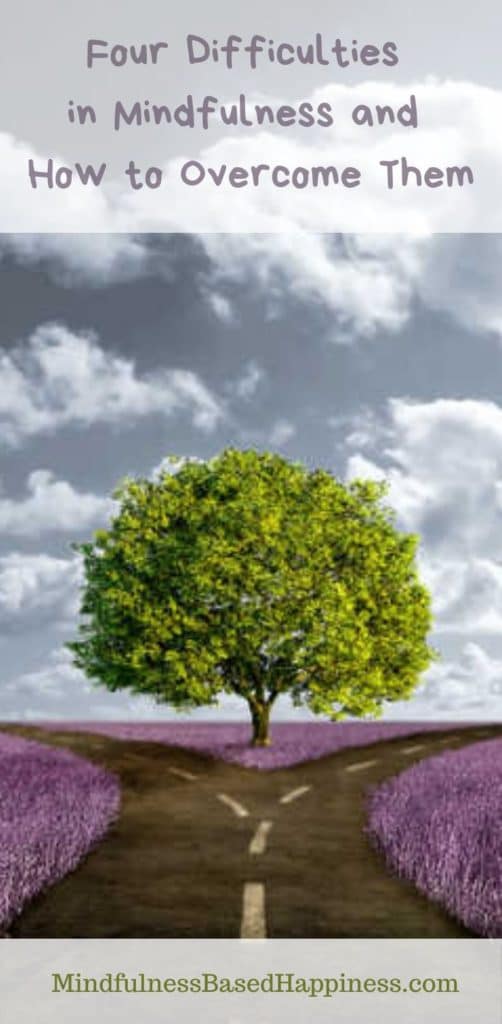Four Difficulties in Mindfulness and How To Overcome Them
Beginners often have a number of common difficulties when starting our with mindfulness. Luckily, a great number of solutions exists. This posts gives you the most important ones.
[ez-toc]
I cannot meditate, my mind is all over the place
Obviously, if you have tried any form of meditation, you know this is going to happen. You mind will wander. And, if you are like me, it will jump around like a crazy monkey.

When I was a child, I once tried to stop my thoughts. I can tel you I did not get very far with that. I stopped after no more than a minute :-).
But, most meditations consider the fact that the beginner complains that his mind does not want to stay on the meditation as progress.
When I tell this to beginners, they do not want to believe this. But is is the truth. your mind has always been all over the place without you noticing it. Meditation has the advantage (or disadvantage if you want) that you start seeing it.
But in my opinion, it is better to have a correct diagnosis. At least now you can do something about it.
So, what is the prescription?
- As a beginner, I would strongly recommend you to use guided meditations. I guess that is why they are so popular. Just google ‘free guided mindfulness meditation‘ and you will have a lot of choice. Just chose a voice that is pleasing to you. Somehow our minds are less prone to distraction when we listen to someone.
- In my post on the 9 basic mindfulness attitudes according to John Kabat Zinn, he lists basic character traits that we need to develop in order to become skillful at mindfulness. The most important ones to overcome a distracted mind are acceptance and patience. We need to accept that we are not going to be great meditators any time soon (including myself) and then muster the patience to continue in our venture.
So, just keep practicing using the instructions that you have been given and you will see a steady improvement in the long run. Your thoughts will calm down, just do not expect to have it happen fast.
I see no progress at all

What you often hear form meditation instructors is that you should not be concerned with progress. Just do the exercises and you will be fine.
But let’s be honest, if there is no progress, you will not continue you practice.
You should however be cautious about what you expect.
But in general, my advice would be different if you are a beginner or if you have meditated for some time.
Advice for beginners
The two main obstacles for novices are that in the beginning, it is very difficult to judge our own progress. Secondly, we often have unrealistic expectations of what could unfold.
Both are addressed in the 8 week MBCT or MBSR trainings because they are important.
Typically, the teacher will ask the participants to go through the full program before forming an opinion. That is because the benefits of meditation are unfolding slowly.
Especially in the beginning.
The first hurdles are the hardest to take. So give it some time. Take up a practice, do this for a few weeks and then reflect back.
Try to imagine yourself a few weeks ago. Is there any difference? Did some things change? Can I concentrate for a bit longer? Do I stress out less about <fill in yourself>? Did I practice more in the last couple of weeks?
As Dan Harris implies in his book ‘10% happier‘, results are not world chocking. But over time and with patience and persistence, you start to see the many benefits of meditation.

Advice for more advanced practitioners
Well, for more experienced meditators, it would take too long to write everything up in this post. The short of it is that you need something called deliberate practice to break down the different skills needed to advance in meditation and to then hone each one until perfection.
This extensive article at rational dharma covers the basics and it a great introduction to the subject. The article details the needed skills up to the intermediate level. It is based on the work by Culadasa, a neuroscience professor that became a monk in his later life. His excellent book, ‘The mind illuminated‘ covers the whole process until expert meditation. For those that are stuck (like everybody gets during the journey), this is an invaluable resource.
But I prefer to send you over to the source directly ;-).
I have the same thoughts over and over again
Do you remember what was said in the beginning of your meditation journey? You will start thinking that that your mind is now more crazy than before you started doing meditation.
But that is not true.
Actually, you always had these thoughts. It’s just that you now notice them.
Well, you did not have them all the time, but from time to to time, you were circling in your head.
That is what is called rumination. According to wikipedia, rumination means:
Rumination is the focused attention on the symptoms of one’s distress, and on its possible causes and consequences, as opposed to its solutions
wiki

Painting by Karl Stiler
As a side note, isn’t is interesting that rumination comes from the Latin ruminare, which means “to chew over again”?
So, what’s my point?
The point is that you had these thoughts in the past, and you should expect to have them while meditating again.
Personal story: I agree that rumination or going over and over problems without ever getting to an answer is horrible. I especially have these in regards to politics. Where I live, the ‘opposite’ has won.
And I really dislike their point of view.
I can tell you that I spent many hours during my silent retreat rehasshing the same kind of thoughts over and over again.
And getting nowhere.
So what is the solution?
Well, just be mindful of the thoughts.
Over and over again.
And try to avoid the mistake I made by getting upset because they kept coming back.
Try to watch them with as much detachment as you possibly can. And be forewarned that this is easier said than done.
But having this information, and being mindful of it, greatly helps to reduce the problem.
Another thing that helps is to bring in a little humor. When you see the thoughts again, smile. And think: “ah, there they are again”. Usually, this goes a long way in reducing the intensity of your negative feelings towards your rumination.
But in the end, it is the skills of acceptance, patience and diligence that will get you trough.
First accepting that you are ruminating and that it will take some time to get over it. And secondly, having the patience and diligence to look at the thoughts over and over again, without interfering and letting them dissolve of their own accord.
I have disturbing thoughts or emotions
In general, when you have disturbing thoughts or emotions, the methods described in the previous question also apply.

More specifically, you should keep calm and look at your emotions and thoughts in a mindful, neutral way. And realize that they will not simply vanish because you are looking at them (although they sometimes do).
Doing this in a patient and consistent way goes a long way in reducing the disturbing emotions.
But, from my own experience with an anxiety disorder, I know that this is easier said than done.
Some of these emotions can be so overwhelming that it can seem you will burst if you look at them.
So here is another game plan you can use:
- If emotions become overwhelming when you look at them, first look away. This can be by changing the focus from the emotion to your feet for instance. The feet are a great place to start since usually we do not feel strong emotions there.
- You can also look away by going into nature or concentrate on a object outside of you like a tree. This has the same purpose a concentrating on our feet.
- Just do this mindfully. Do not start to mindlessly surf the internet in search for cat pictures that make you feel better. No, it is still a mindfulness practice.
- Next, try to get a small glimpse of your difficult emotion. Has changed? If yes, in what way? Again, try to stay mindful through this process. Try to not push the experience away.
- If you are overwhelmed by going back to the emotion, go back to mindfulness of your feet or of nature.
- Alternate between the emotion and your diversion for some time.
- Hopefully, by now, your symptoms have become less intense.
What also can help is to know that having disturbing experiences in meditation is not uncommon. For a more detailed overview of this topic, I gladly refer you to my article “Is Mindfulness dangerous”
But in the end, if your symptoms persist, I strongly encourage you to seek out the advice of a trained psychologist or psychiatrist. I had to do the same for my anxiety disorder. I even went on prescription medication for some time. There is no shame in getting help, and there is only so much one can do on your own.
Your Turn
Please do let me know if you have problems that I did not address. I will respond to the comments, or add it as an extra problem.
Or feel free to let me know which solution you use for a specific problem. I’d love to know and learn from you!
Featured image is ‘Crossroad in lavender meadow’, courtesy of Iain Merchant

Hi, I’m Olivier Devroede and I have been meditating seriously since 2009.
Due to the great benefits I have seen in meditating, I decided to become an MBSR trainer myself and start a blog.


